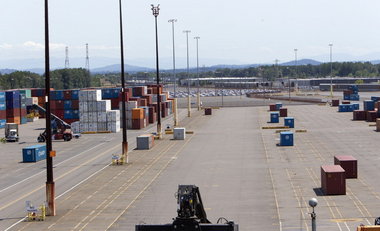forum
library
tutorial
contact

Judge Appoints Ex-governor to Settle Port Dispute
by Steven DuBois, Associated PressRegister-Guard, June 23, 2012
|
the film forum library tutorial contact |

|
Judge Appoints Ex-governor to Settle Port Disputeby Steven DuBois, Associated PressRegister-Guard, June 23, 2012 |
 PORTLAND -- A federal judge on Friday appointed former Oregon Gov. Ted Kulongoski to help settle a dispute between two unions that has slowed the flow of cargo at the Port of Portland.
PORTLAND -- A federal judge on Friday appointed former Oregon Gov. Ted Kulongoski to help settle a dispute between two unions that has slowed the flow of cargo at the Port of Portland.
U.S. District Judge Michael Simon said the slowdown staged by longshore workers has caused economic harm to the region and the suffering will only get worse without a quick resolution. He ordered lawyers to meet with Kulongoski on Monday morning.
Simon made the surprise announcement late Friday afternoon at the end of a 3 1/2-hour hearing in which the National Labor Relations Board asked for a temporary restraining order that would require workers to speed things up or risk a contempt of court charge.
The judge did not act on the request, and it remains to be seen when operations will return to normal.
The slowdown involves a dispute between members of the International Longshore and Warehouse Union and the International Brotherhood of Electrical Workers over which union workers should plug-in and unplug refrigerated shipping containers known as reefers.
The conflict has led the two main shipping lines that serve the port's Terminal 6 -- Germany's Hapag-Lloyd AG and South Korea's Hanjin -- to divert their ships to other ports. Truck traffic at the port has been backed up for more than two weeks.
Amanda Gamblin, a lawyer for the company that operates Terminal 6, told the judge that the gates could close next week if normal operations don't resume.
The economic damage from the slowdown has not been tallied, but more than 1,000 regional businesses depend on the container terminal to get their goods to or from international markets. When ships are diverted and cargo must be rerouted, that adds costs to shippers and potentially devastating delays to companies importing or exporting perishable or seasonal items.
"Oregon has had significant success positioning itself as a key player in the global economy, selling our goods and services to the world," Gov. John Kitzhaber said Friday. "An important part of the strategy is being able to actually move goods around the world. Being hamstrung from doing so is a significant setback."
Importers' containers typically include items such as furniture, clothes, shoes, tires and toys. The port's exporters tend to ship agricultural or raw goods, such as frozen foods, hay or animal feeds, and wood products.
Portland's Terminal 6 is by far the smallest of the six container- shipping ports on the West Coast. It's at a disadvantage compared with the other Pacific ports because it's more than 100 miles from the mouth of the Columbia River, and ships need pilots to bring them to port.
"When you step up to the plate, you already have two strikes, and then they get into these disputes over this trivial stuff," said Bob Coleman, director of business development at Allports Inc., a freight forwarder. "In the end, it's going to hurt both unions, the bar pilots, the river pilots and everybody who's engaged in international trade."
Port managers are concerned that the shippers bypassing Portland might decide they can live without the port.
learn more on topics covered in the film
see the video
read the script
learn the songs
discussion forum
